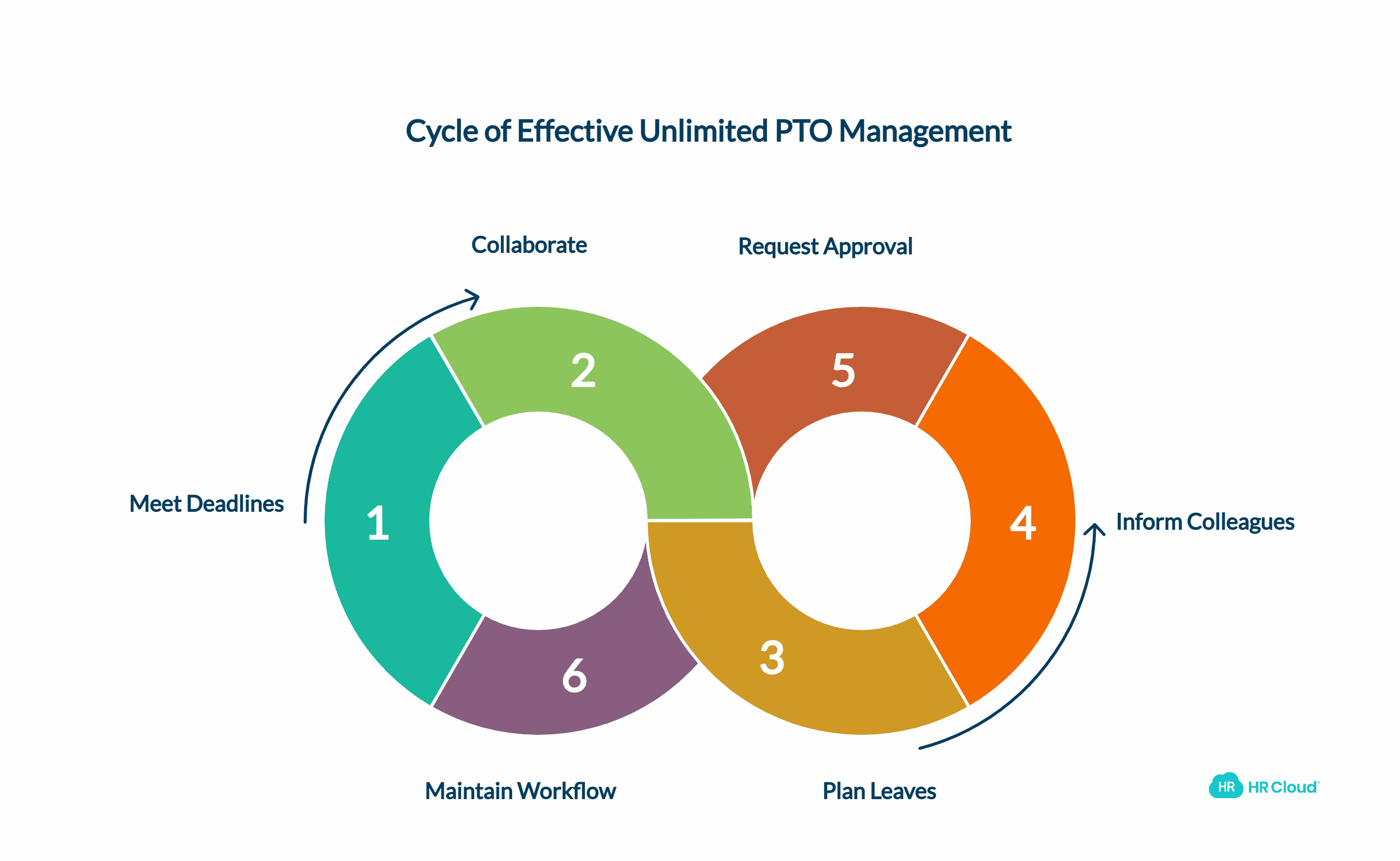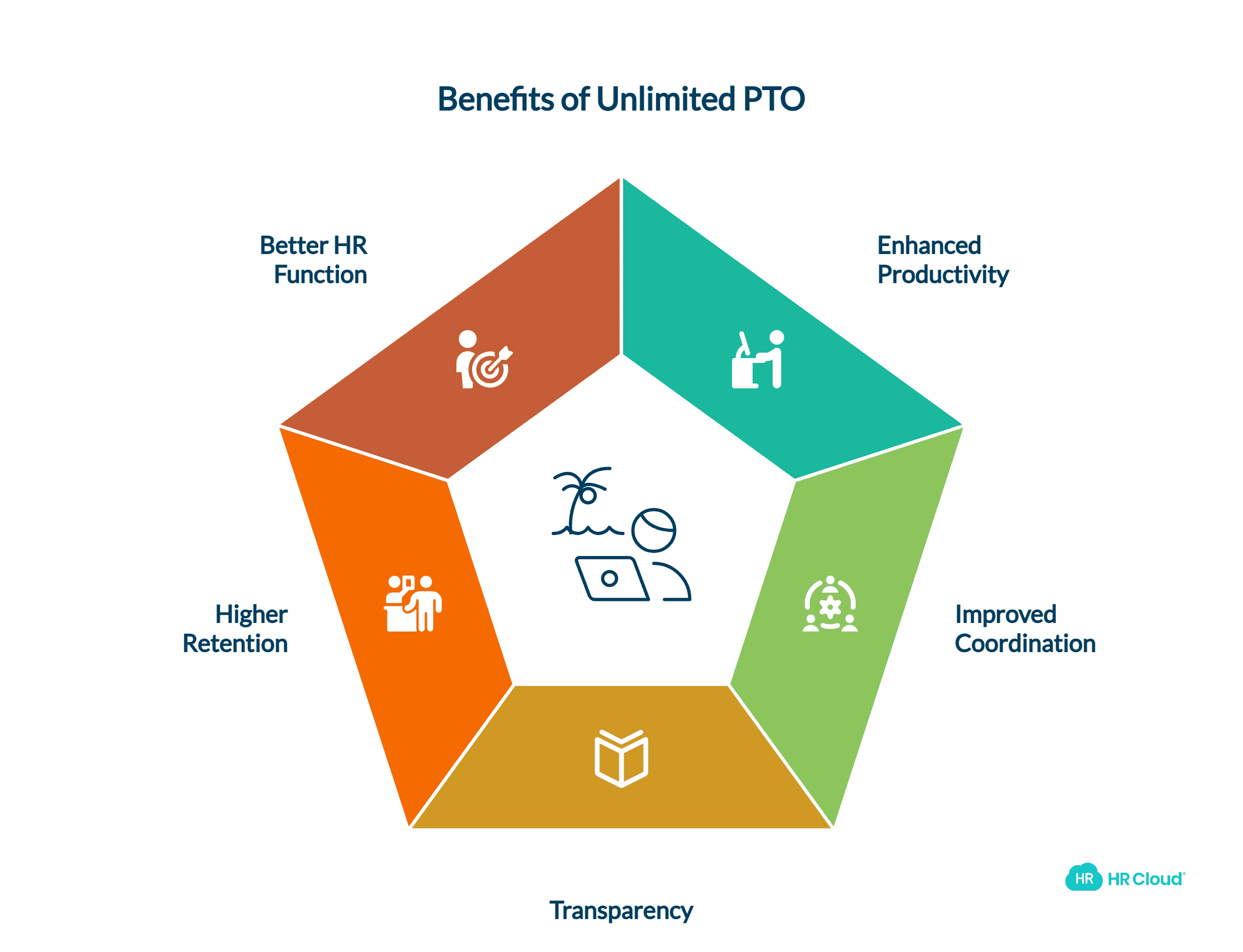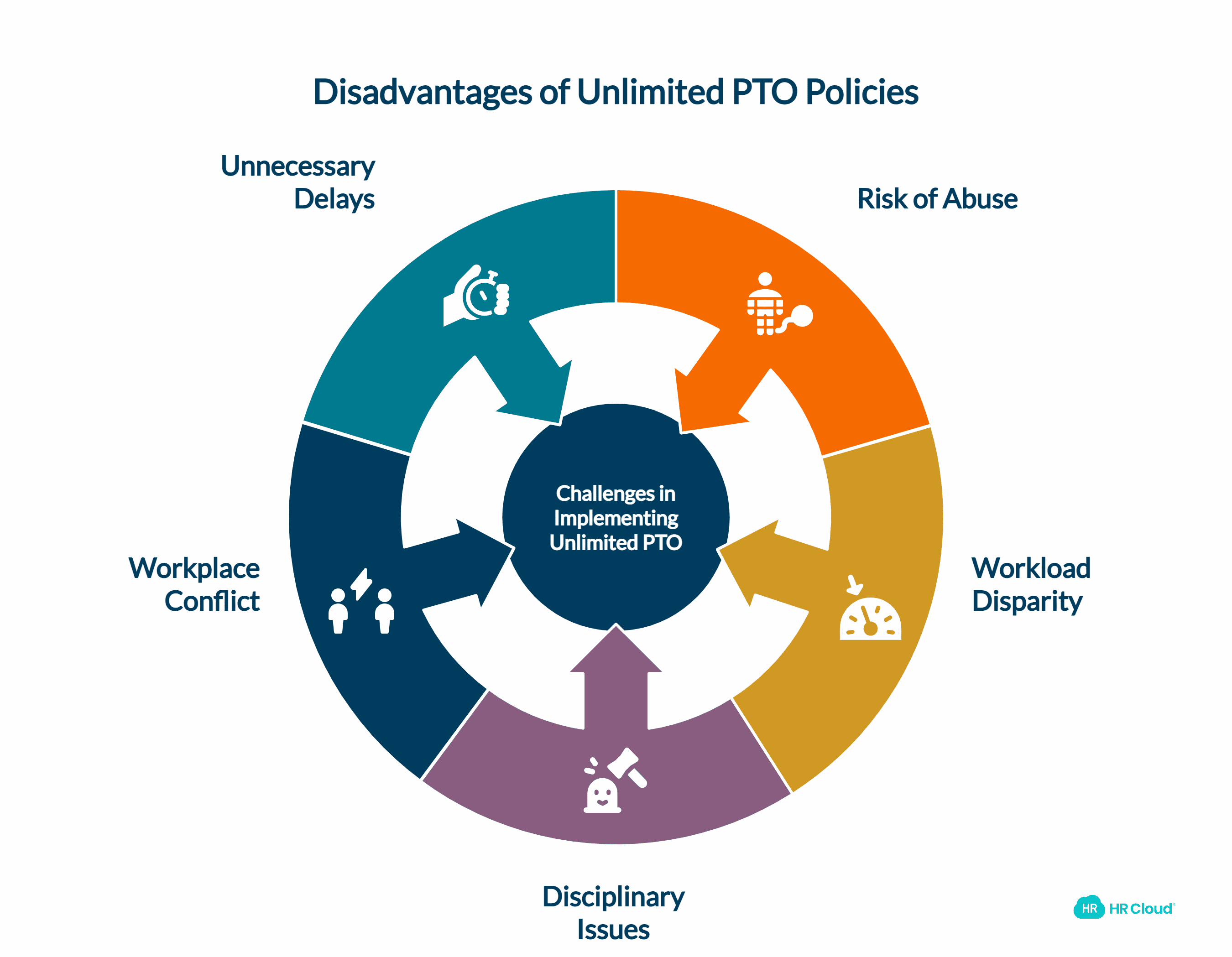Unlimited PTO: Pros and Cons That Every HR Specialist Should Know
.png)


 Cut onboarding time
by 60%—here's the
Ultimate Checklist
that helped do it.
Cut onboarding time
by 60%—here's the
Ultimate Checklist
that helped do it.

Having an unlimited time off policy makes it possible for companies to improve retention and attract top talent from their respective industries. As a powerful employee benefit and retention strategy, unlimited paid leave has gained popularity in recent years. However, its implementation may not be easy. There are many drawbacks to offering unlimited vacation days, making the policy susceptible to abuse if you're not careful.
The HR policy encompassing paid time off may vary from one organization to another. Most companies strive to keep their PTO allowance at a bare minimum, increasing it gradually with an employee's tenure.
However, considering the current trends in workforce management and the rise of remote work, there are some companies that have started offering unlimited paid vacation to their employees.
This is one of the most effective tactics to engage employees and boost their morale at the workplace, as employees have the freedom to take as much paid time off from work as they want, compared to the limited number of days.
Nevertheless, there’s a flip side to everything, and an unlimited PTO policy is no exception.
So, if you've been thinking about implementing an unlimited vacation policy at work, here are a few pros and cons that you should consider before doing so.
Understanding Unlimited PTO Policy
Before we explore the pros and cons of having an unlimited PTO policy, let’s first explore the concept briefly.
Unlimited time off is a leave policy often considered by companies where employees are allowed to take as much free time from work as they want, as long as they meet their deadlines and keep up with their to-do lists.
Now, does this mean that if an employee has achieved his targets for the quarter in two months, he can take the remaining days off? No. It’s not that simple.
Keeping up with your deliverables doesn’t mean that you only have to complete the tasks that have been assigned to you. You may also be a collaborator on tasks assigned to others where your assistance is required to get the job done.
This means you have to be smart when planning to take paid time off. It’s essential that you schedule your leaves with careful consideration and inform others working alongside you on a project beforehand.
This way, you’d be able to keep the needle moving, and your absence wouldn’t affect the company’s workflows.
Plus, an unlimited vacation policy doesn’t completely liberate employees to be absent from work whenever they feel like it, as you technically request a PTO, and your request can either be approved or rejected by the supervisor.
To put it simply, unlimited PTO policies remove the limit on employees' ability to take a certain number of leaves in a given year. And it's currently perceived as one of the most valued employee benefits for modern workers, especially in conjunction with flexible scheduling options.
Pros of Having an Unlimited PTO Policy
There are a number of benefits to having an unlimited PTO policy for your employees. Here are a few important ones worth considering:
Enhanced Productivity
Removing the cap on leaves for your employees helps maximize efficiency and significantly improves their productivity and well-being.
The employees know that they can take as many vacation days as they want, as long as they keep up with their deliverables. So, it’s a no-brainer that no one would want to miss out on an opportunity like this.
Therefore, it’s natural that they’d try their best to stay focused and make the most of their time at work.
They’d be less likely to succumb to distractions around them or take excessive breaks from work just to kill time because going on a holiday sounds so much better than a gossip session near the coffee machine.
Allowing employees to take a break from work whenever they feel like it greatly minimizes the likelihood of exhaustion, which in turn benefits the company. Employees who are less likely to feel burned out or stressed tend to be more productive, engaged, and loyal to the company. This focus on employee wellness can be a significant factor in combating issues like the "great resignation" phenomenon.
Improved Coordination
Having an unlimited PTO policy can significantly improve coordination at work. In order to be eligible for paid time off, employees have to complete their tasks and make sure that their absence doesn’t impede the company’s workflow.
This greatly improves coordination among employees and promotes communication at work, as getting the work done becomes a priority for all. As a result, everyone is on the same page and knows what’s expected of them and their peers, leading to more effective workforce management.
Transparency
Having an unlimited paid leave policy promotes transparency at the workplace and eliminates the possibility of employees making excuses to skip a day or two.
People generally call in sick when they don’t feel like going to work or need a day off for personal commitments.
However, with an unlimited leave policy, employees don’t have to lie to take a day off from work. They know that they can take as many days off as they want as long as they achieve the set goals. So, there’s no point in making excuses or being indirect when they need a break, whether it's for sick leave or personal time off.
Higher Retention
Working for an employer offering unlimited paid vacation is nothing less than a blessing, especially considering the current conditions of the job market.
With even the leading companies resorting to excessive layoffs, unlimited time off is a sought-after perk that can help companies not only improve employee retention but also attract top-tier talent from their respective industries. It's a powerful retention strategy that can set your company apart in a competitive job market.
Better HR Function
An unlimited PTO policy significantly decreases the menial and repetitive work that a company’s HR department generally does to keep track of employee leaves and accruals.
The policy won’t completely exclude leave management from HR’s responsibilities, but it’d make the process a lot less tedious.
This helps improve the HR function and makes it possible for concerned stakeholders to focus on things that matter, such as strategic workforce management and enhancing other employee benefits.
Cons of Having an Unlimited PTO Policy
When implementing an unlimited PTO policy, it’s not ideal to only consider its benefits and ignore the drawbacks associated with it. Here are a few noteworthy disadvantages of having an unlimited paid time off policy:
Risk of Abuse
One of the major cons of implementing an unlimited PTO policy at work is the risk of its abuse by employees.
No matter how carefully you've crafted the terms and conditions in your employee handbook, it's highly likely that employees will find a loophole and exploit the policy.
The best you can do is educate employees about fair use and expect them to pay attention to the message you're trying to convey. It's crucial to have clear guidelines in place to prevent policy abuse.
Workload Disparity
Even in a company with an amazing culture, there will always be employees who are looking for an excuse to be absent from work. So, it’s natural for them to take excessive days off from work if a company chooses to deploy an unlimited PTO policy.
This may cause disparity when it comes to workload distribution, as the ones who are committed to their work may end up grappling with increased workload concerns due to the absence of their carefree co-workers.
Inability to Take Disciplinary Action
When a company has a cap on the paid time off for its employees, taking disciplinary action against people who've exceeded the limit is much easier.
The exact number of vacation days an employee can request time off from work is mentioned in an appointment contract and clearly communicated at the time of onboarding.
However, things are not that simple when you have an unlimited PTO policy. Since there's no contractual obligation when it comes to off days, it may be difficult for the company to take action against employees who abuse the policy. This can create challenges in terms of employment law and maintaining fairness in the workplace.
Workplace Conflict
An unlimited PTO policy can cause some employees to develop resentment towards others, which may lead to critical workplace issues and affect the company's culture.
Some people tend to take more days off than others. And while they’re off to their favorite holiday destination for a vacation, someone else is filling their shoes and trying to get the work done.
This can give rise to workplace conflicts, which may severely affect employee performance and the company’s progress.
Unnecessary Delays
Having an unlimited PTO policy may cause unnecessary delays and make it challenging for employees to keep the needle moving.
No matter how careful employees are when it comes to planning their off days, their absence lowers the company’s operational capacity in one way or another and affects its overall progress.
As a result, the company may experience unnecessary delays with respect to achieving the set milestones.
It’s a Wrap
The implementation of an unlimited paid time-off policy requires careful consideration by the company.
The policy certainly comes with a variety of benefits. It has the potential to boost employee satisfaction and elevate the company’s retention significantly.
However, it’d be simply unwise to ignore the drawbacks associated with it and their impact on the company’s performance.
When considering unlimited vacation days, it's crucial to balance the needs of the business with employee well-being. This may involve creating a comprehensive leave policy that addresses potential issues like leave accrual, vacation accrual, and compliance with state leave laws. Additionally, companies should consider how unlimited PTO fits into their broader employee benefits package and overall workforce management strategy.
Ultimately, the success of an unlimited PTO policy depends on clear communication, trust between employers and employees, and a strong company culture that values both productivity and work-life balance. By carefully weighing the pros and cons and implementing thoughtful policies, companies can harness the benefits of unlimited time off while mitigating potential drawbacks.
Author Bio:
Syed Balkhi is the founder of WPBeginner, the largest free WordPress resource site. With over 10 years of experience, he’s the leading WordPress expert in the industry. You can learn more about Syed and his portfolio of companies by following him on his social media networks.
Keep Reading
Caregiver Turnover in Home-Based Care: 5 Fixes That Actually Work
Home healthcare agencies face alarming turnover rates of 75%, with most caregivers
10 Workforce Management Issues Hospitals and Home Care Teams Face (and What Fixes Them Fast)
"We're hemorrhaging nurses faster than we can replace them, and our current systems can't
Understand The Employment Contracts: Key Legal Considerations for HR
One of the hallmarks of any successful business is a clear understanding of the
Like What You Hear?
We'd love to chat with you more about how HR Cloud® can support your business's HR needs. Book Your Free Demo

Build a Culture of Recognition. Boost Engagement. Guaranteed.
Workmates empowers employees to stay informed, connected, and appreciated—whether they’re on the front line, in the office, or remote. Recognition drives 12x higher engagement.Trusted by industry leaders in every sector




Cut Onboarding Costs by 60%.
Take the confusion and follow-ups out of onboarding with automated workflows, digital forms, and structured portals—so new hires ramp faster 3X quicker.Trusted by industry leaders in every sector




